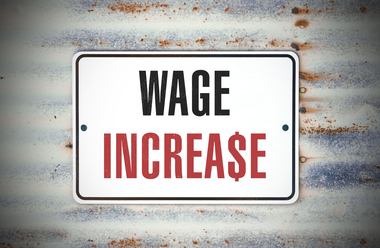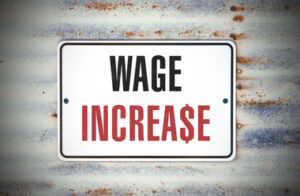
3 Reasons To Pay Above the Minimum Wage
Enacted in 1938, the Fair Labor Standards Act governs the federal minimum wage, among other things. Last increased in 2009, the federal minimum wage stands at $7.25 per hour. Many states and some localities have their own minimum wage laws that set the minimum higher than the national rate.
 Minimum wage laws represent only the legal bare minimum. It does not mean that employers should not pay more. Below are three reasons to pay above the minimum wage.
Minimum wage laws represent only the legal bare minimum. It does not mean that employers should not pay more. Below are three reasons to pay above the minimum wage.
1. The minimum wage might not be a livable wage.
According to a congressional report, “The real value of the federal minimum wage has declined 24% since 1968. Today, the federal minimum of $7.25 leaves an adult with two children thousands of dollars below the federal poverty threshold. This is unacceptable.”
While some policymakers are pushing to raise the federal minimum wage for private-sector workers, the effort has been unsuccessful thus far. It’s worth noting that an executive order raising the minimum wage to $15 per hour for federal workers and contractors is now in effect.
In addition, many states and some localities have a minimum wage higher than that mandated by federal law. But the increases are oftentimes incremental and spread out over a period of years.
2. Higher wages improve morale and productivity.
A major concern for small businesses especially is that paying more than the minimum wage could eat away at their profits. Experts say this line of thinking is counterproductive because low wages are associated with various negative outcomes.
For example, employees may:
- Become financially stressed.
- Feel demoralized.
- Call in sick more frequently.
- Perform poorly at work.
- Leave the company for more competitive wages.
Note that financial stress is linked to physical ailments such as:
- Migraines.
- Anxiety.
- Digestive issues.
- High blood pressure.
- A weakened immune system.
- Muscle tension.
- Heart arrhythmia.
Along with enhancing employee well-being, higher wages improve organizational health by mitigating the costs of turnover.
3. Paying higher wages boosts quality of hire.
Jobs that pay the minimum wage are commonly found in the restaurant, hospitality and retail industries. One could argue that such jobs do not require much education or high-paying skills, therefore, low pay is justified.
However, it’s important to remember that even if the job does not require much in the way of education or technical skills, other factors are vital to employee success. This includes soft skills like punctuality and reliability, the ability to follow instructions, trustworthiness, collaboration capabilities, and customer service etiquette. Employers that pay only the minimum wage may find it difficult to attract qualified candidates with these attributes.
Keep in mind, too, that you might be required to pay more than the minimum wage. For example, salaried employees who are exempt from the FLSA’s minimum wage and overtime pay requirements must receive no less than $684 per week. Check your local state laws as well.




